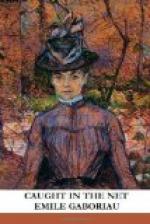“So it is, madame; but the facts remain. Only tell me one thing, have you any special objection to M. de Croisenois paying his addresses to your daughter?”
“Certainly not.”
“He comes from a good family, is well educated, handsome, popular, and only thirty-four. If you remember, George was his senior by fifteen years. Why, then, is not the marriage a suitable one? Certainly, he has led rather a fast life; but what young man is immaculate? They say that he is deeply in debt; but then your daughter has enough for both. Besides, his brother left him a considerable fortune, not far short of two millions, I believe; and to this, of course Henry will eventually succeed.”
Madame de Mussidan was too overwhelmed by what she had already gone through to offer any further exposition of her feelings on the subject.
“All this is very well,” answered she; “but the Count has decided that Sabine is to become the wife of M. de Breulh-Faverlay, and I have no voice in the matter.”
“But if you exert your influence?”
The Countess shook her head. “Once on a time,” said she sadly, “I reigned supreme over Octave’s heart; I was the leading spirit of his existence. Then he loved me; but I was insensible to the depths of his affection, and wore out a love that would have lasted as long as life itself. Yes, in my folly I slew it, and now——” She paused for a moment as if to collect her ideas, and then added more slowly: “and now our lives are separate ones. I do not complain; it is all my own fault; he is just and generous.”
“But surely you can make the effort?”
“But suppose Sabine loves M. de Breulh-Faverlay?”
“But, madame, a mother can always influence her daughter.”
The Countess seized the doctor’s hand, and grasped it so tightly that he could hardly bear the pain.
“I must,” said she in a hoarse whisper, “divulge to you the whole extent of my unhappiness. I am estranged from my husband, and my daughter dislikes and despises me. Some people think that life can be divided into two portions, one consecrated to pleasure and excitement, and the other to domestic peace and happiness; but the idea is a false one. As youth has been, so will be age, either a reward or an expiation.”
Dr. Hortebise did not care to follow this train of argument—for the Count might enter at any moment, or a servant might come in to announce dinner—and only sought to soothe the excited feelings of Madame de Mussidan, and to prove to her that she was frightened by shadows, and that in reality she was not estranged from her husband, nor did her daughter dislike her; and finally a ray of hope illuminated the saddened heart of the unfortunate lady.
“Ah, doctor!” said she, “it is only misfortune that teaches us to know our true friends.”
The Countess, like her husband, had now laid down her arms; she had made a longer fight of it, but in both cases the result had been the same. She promised that she would commence operations the next day, and do her utmost to break off the present engagement.




